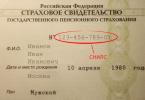One of the consequences of violations while living in Russia is the expulsion of foreign citizens from the Russian Federation. This measure of punishment means expulsion from the territory of the state forcibly due to violation of the norms of administrative or migration law. But often deportation and expulsion are identified, which is fundamentally wrong.
![]()
The concept of expulsion
 The institution of deportation regulates the forced, but, as a rule, independent departure of a foreigner, which is how it differs from expulsion. The main one is the lack of grounds for legal residence within the country. The migrant is simply forced to leave the Russian territory, since he has expired the period during which he had the right to live in Russia. The decision to deport can be canceled in court.
The institution of deportation regulates the forced, but, as a rule, independent departure of a foreigner, which is how it differs from expulsion. The main one is the lack of grounds for legal residence within the country. The migrant is simply forced to leave the Russian territory, since he has expired the period during which he had the right to live in Russia. The decision to deport can be canceled in court.
Administrative expulsion from the Russian Federation is one of the types of punishment provided for committed offenses. It is far from always that we are talking about illegal actions in the field of migration law. The decision is made only for those violations for which, under Russian law, an administrative penalty is imposed. In addition, persons are subject to forced deportation due to violation of the customs rules established in the country or an attempt to enter the Russian Federation with a fake passport.
The main differences from deportation
- Expulsion is a type of liability for a committed offense. Deportation is recognized as only one of the instruments of state influence on a person.
- For expulsion, a court decision is required, it is preceded by a period for considering a case on violation of the Code of Administrative Offenses of the Russian Federation. Deportation becomes possible when the corresponding order is taken by the head of the Main Department of Internal Affairs of the Ministry of Internal Affairs of Russia. In order to make this decision, usually enough grounds in the form of lack of the right to stay inside the country.
- The decision on deportation must be executed within five days, and the decision on administrative expulsion - immediately after its entry into force.
- The deadline for filing an appeal also differs. The decision to deport a citizen from Russia can be appealed and canceled within three months. When expelling, the period is different - only ten days after receiving the decision.
Reasons for application
 The process is a forced expulsion due to the loss by a foreigner or stateless person of any legal grounds for residence (work, study) in the Russian Federation. The most common reasons include:
The process is a forced expulsion due to the loss by a foreigner or stateless person of any legal grounds for residence (work, study) in the Russian Federation. The most common reasons include:
- Delayed departure from the country (the validity of the visa or the maximum visa-free stay has expired);
- the validity period of the work permit (patent), temporary residence permit has expired, the residence permit was canceled, confirming the legality of residence;
- a foreign person could not receive, lost or lost it;
- entry into the country was illegal (carried out on false personal documents);
- the presence of a foreigner on the territory of Russia was recognized as undesirable.
Consequences of deportation
The decision to deport any real consequences does not entail. Problems can arise only if a foreigner categorically refuses to leave Russia for a long time. In this case, the migrant is sent home forcibly, accompanied by an escort up to the plane (train, bus abroad).
In case of systematic violations of the regime of stay in Russia, the GUVM decides to impose a more severe punishment, including a restriction on entry.
How to dispute
 The decision can be canceled within three months from the moment the foreigner became aware of it. An appeal against a court decision is accepted only for ten days.
The decision can be canceled within three months from the moment the foreigner became aware of it. An appeal against a court decision is accepted only for ten days.
Contestation is usually carried out in court. In rare cases, the appeal is addressed to the head of the migration authorities (GUVM of the Ministry of Internal Affairs of Russia). A positive outcome of the case allows you to cancel the administrative decision.
Reasons for expulsion
The difference lies in the fact that expulsion is possible only as a result of violation of the laws of Russia:
- illegal employment;
- the absence of a citizen on the registration account;
- violation of the rules of stay inside the country or transit;
- non-compliance with the real purpose of the visit stated in the migration card;
- failure to provide or lack of permits;
- untimely receipt of a duplicate of the lost documents confirming the right to stay in the country;
- refusal to leave the state territory at the end of the terms of the possible residence;
- committing an offense under the Code of Administrative Offenses of the Russian Federation.




